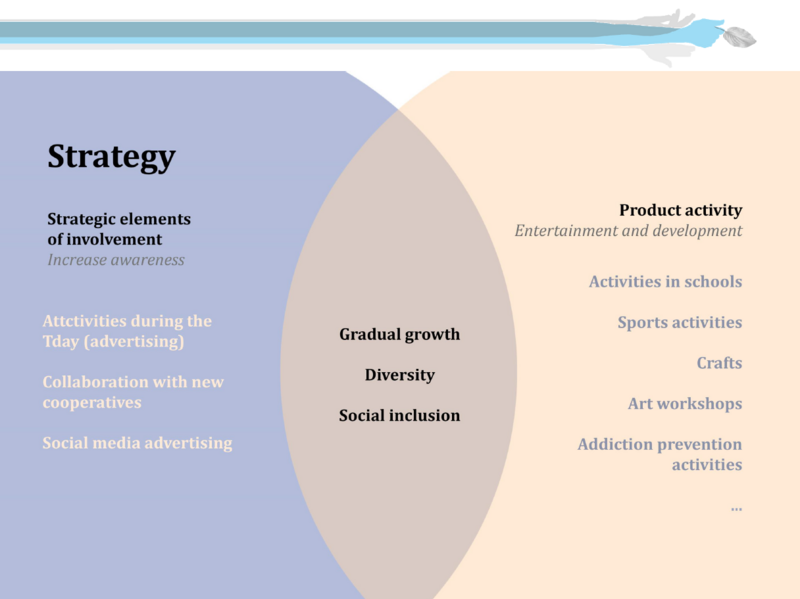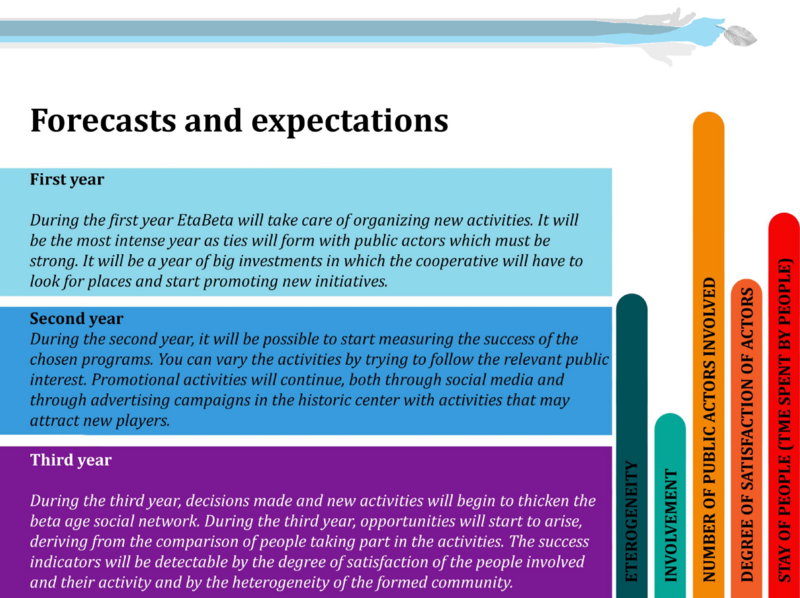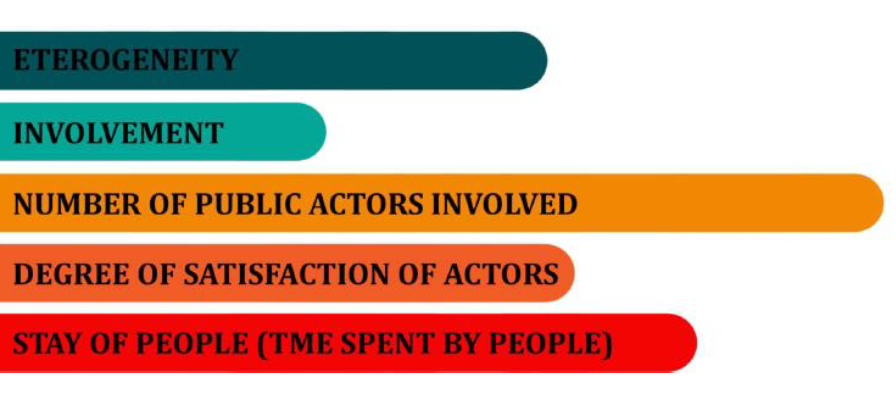LED2LEAP 2020 - Bologna Team 1
>>>back to working groups overview
Landscape Democracy Rationale
- This context is relevant for the landscape democracy perspectives, in fact the fundamental concepts at the basis of this social cooperative ONLUS (EtaBeta) are the social integration, equality and environmental sustainability. These values belong to the community, which has created a socially useful space within empty space
Location and scope
- Location : Italy,Bologna 40138, Villaggio del fanciullo]]
- Next to showing us where you are, you may also use this map to localise different focus themes of your community
Mapping
- EtaBeta is a company that works with public and private entities in order to promote appropriate opportunities for socialization and social inclusion. The projects and programmes are aimed mainly at people in situations of fragility and social marginality. The community offers to listen to the needs of people and public bodies by finding together with them initiatives and solutions to identify socio-rehabilitation paths of start-up work.
Groups of actors and stakeholders in your community
- The principal stakeholders are municipal and private asociations like Azienda USL di Bologna, Caritas, Confederazioni Sindacali Cgil, Cisl, Uil, Unindustria Bologna, CNA Bologna, Legacoop Bologna, Gestori e ospiti SPRAR e CAS Bologna, Arcidiocesi di BolognaComunità ebraica di Bologna, Coordinamento islamico di Bologna, UNHCR, Fondazione Innovazione Urbana. The components of the community are the operators, children, the elderly, drugs addicts, prisoners, and the socially less visible people.
Relationships between your actors and groups
- The person protagonist of the rehabilitative social path is the bearer of a wealth of values from an emotional and economic cultural point of view. EtaBeta is responsible for bringing out these values, highlighting them in order to enable social and work integration.
- Relationships between the groups
-Sharing of learning sites -Sharing of workplaces -Socio-cultural participatory activities
Results: The community creates a equal bond between participants. They are invited to participate by sharing their life experiences and valutes, creating a collective support network.
- Farming
- Cooking
- Training courses
- Handicraft & Construction
- Library of natural materials
Social activities
- School activities
- Informal activities
Summary of your learnings from the transnational discussion panel on April 22
On April 22 you will present the PPT version of this first assignment to other seminar groups working in other geographical community contexts. Please give here a short summary of your learnings during this presentation, for example:
- Other analytical approaches
- Other representation styles
- Other value schemes: any surprises?
- Constructive comments we received on our presentation
Theory reflection
- The seminar lessons were useful in analyzing this phase. Furthermore, direct knowledge of EtaBeta's values, through a meeting with the founder, allowed us to understand the structure and objectives of the association
References
- Site: https://www.etabeta.coop
- Site: https://it-it.facebook.com/pages/category/Arts---Entertainment/Spazio-Battirame-272818529726268/
Phase B: Democratic Landscape Analysis and Assessment
The Scene in your Story of Analysis
- The challenge of landscape democracy created by Eta Beta is the rehabilitation and reintegration process for drug addicts and people with social problems who participate in the activities proposed by the cooperative.
The Actors in your Story of Analysis
- The characters involved in the cooperative are the protagonists, the 3 basic pillars around which "the individual" operates are: Health, community and creativity. The path is composed of moments of sharing and collaboration in which members compare each other. In fact, the physical spaces within which these activities are carried out are not rigid but flexible and free of obstacles for a continuous debate and exchange of ideas; at the same time the individual participant is well aware of his specific role and his position within the cooperative. As a result of simple collaboration, after a few years participants can be hired and can become working members of the community itself.
The Story of Analysis
- In 2006 the association became a non-profit social cooperative of the mixed type A B, born what we know today as EtaBeta: these cooperatives deal both with services to people (A) (retirement homes, social assistance ...) and offer jobs for disadvantaged people (B). The cooperative now collaborates with the municipality of Bologna and other national and non-national associations.The people who take part in the rehabilitation and reintegration process participate in the activities proposed by the cooperative. The proposed activities are agricultural, manufacturing, culinary and culinary, and the cooperative is still developing today reinventing itself to every need and adding new programs and activities. The cooperative produces furniture and deals with glass processing. Chandeliers and dishes are just examples of products that today are sold all over the world, both to individuals and to renowned restaurants and chefs. The flexibility of this cooperative, which is sensitive to the different needs of society as they change over time, has meant that EtaBeta was not passively and negatively affected by the covid crisis, on the contrary, it has managed to create jobs
Reflection on our story
- Our community is a community that must be analyzed and understood both from the human point of view of the relationship between the actors that make it up, and from the abstract metaphysical point of view, in a perspective of transformation with time and with the events that day by day they become part of it and characterize it. EtaBeta is continuously developing, on the move, every day is a challenge to overcome. FEEL GOOD is the mood to follow and living it through Juan is essential to make it better.
Phase C: Collaborative Visioning and Goal Setting
From our point of view
- Speaking with current etabeta actors, emerged the need to create new challenges for the future and new paradigms to follow. The aim is to create opportunities and improve the comparison between the users of the activities proposed by the cooperative. The cooperative is currently confined to itself and is not well known. The main goal is to create heterogeneity within the etabeta activities in order to generate opportnity within the activity itself.
The Actors
- the aim of etabeta is to intervene in the recovery and rehabilitation of people with hendicap and drug addicts, the prerogative is to offer them the possibility of socialization with people from other backgrounds.The social challenge to which we wish to aspire is not to create new initiatives but to take the activities of the cooperative out outside the physical space of the two main offices.
Our objectives over the next 3 years.
- our objectives focus on increasing the number of actors in order to generate positive confrontation for individual growth and a greater diversification of activities in order to generate interest and attract new actors and look for new physical and metaphysical places.
- Our strategy can be divided into two main components:a strategic development that is carried out through advertising activities during the T day, collaboration with new cooperatives. And addiction prevention activities.
- We have drawn up a time and space programme in order to achieve our objectives over the next 3 years.During the first year etabeta will have to take care of organising the new activities, it will be the most intense year as close links will be formed with public operators. Throughout the second year it will be possible to begin to measure the success of the programs carried out, it will be possible to vary the activities by trying to follow the main interests of those involved. Advertising activities will also continue through social media.In the third year decisions taken and the new activities will start to thicken etabeta's social network. During this period, the activities arising from the comparison of the participants will grow.
The success indicators
- The success indicators will be identified by the degree of satisfaction of those involved, by the amount of time that people spend in the activities, by the number of public actors involved, by the involvement and by the heterogeneity. Should the programme be successful, it will be able to deal with trade fairs and festivals, events that are very much appreciated in the area. Under these circumstances etabeta will be able to exhibit its own handicraft products.
Phase D: Collaborative Design, Transformation and Planning
Prototyping Action
The social challenge we want to strive for, as already discussed in the previous phase, is not to create new initiatives but to bring the activities of the cooperative out of the physical spaces of the two main offices. To this end, we created a mobile stand for the T-DAY day, aimed at promoting the image of the cooperative outside the headquarters, in a context populated by potential future players. This initiative will be carried out by members of the communities, who will approach a new audience within a new context.
- add the corresponding visual from your presentation to the image gallery below
The Evolution
The members of the cooperative will have the task of engaging as many actors as possible and, at the same time, they will be involved in a new activity, which will allow them to interact outside the cooperative and get new stimuli from the society. In this mutual exchange of information, potential new actors will get the chance to get to know Eta-Beta and its initiatives
- add the corresponding visual from your presentation to the image gallery below
The Plan
Two major activities will be carried out at the stand:the sale of 0-km land products (smoothies and centrifuges).the promotion of the activities carried out on the premises. All the development of the project will be carried out by the cooperative, both for the logistics and for the concrete construction of the stand, using the laboratories that Eta Beta already has among its own activities.
- add the corresponding visual from your presentation to the image gallery below
The Realization
Our aim is to create a stand which can, during these days, involve passers-by making them aware of Eta-beta both from a social and practical point of view, showing them the activities that are held in the premises, creating on-site interactive workshops, working in collaboration with the Municipality of Bologna, the students of the Faculty of Agriculture and other stakeholders.
- add the corresponding visual from your presentation to the image gallery below
Reflect
The online lessons of Phase D were helpful to think about the logical elaboration process of our idea.They made us understand how this could be split into two types: a one-way one, with a direct start and finish, and a discontinuous one (with multiple points of reflection).The indicators of success are measured by time elapsed: -short term -long-term Short-term success indicators are those found at the end of an example day: number of people involved in the daily stand, income gained from the sale of products, etc...Long-term indicators can be found in the effective growth of the cooperative's social network and thus in the number of new steakholders interacting with Eta Beta.
Phase E: Collaborative Evaluation and Future Agendas
Collaborative Evaluation and Landscape Democracy Reflection
Our investigations on cooperatives have allowed us to identify the weaknesses and to understand how to deal with these problems; for this reason we have focused on these problems in order to try to establish more EtaBeta on the territory. The critical points we have identified are:
- Lack of knowledge of the cooperative in the territory
- Lack of stimulating activities for needy members
- Lack of stimulating activities that attract new actors
Our team has tried to analyze the community to get to know it in depth and see what could be the most suitable interventions for improvement. Our role as designers/architects has focused mainly on the organization of a three-year calendar that could, in the long and short term, meet the listed goals. Our work therefore did not have the prime purpose of building something physical, but rather, above all, sought to fit into the organization of EtaBeta to create new stimuli and improve the logistics of the cooperative.
The Actors in your Collaborative Evaluation
Stakeholders interested in the Living Lab, which may actually be able to help and support the cooperative alongside, are:
- University of Bologna
- Municipality of Bologna
- AUSL
- Municipal Police
All the stakeholders listed were able to contribute to the achievement of our main objectives, not from a logistical point of view, but from a practical and legislative one. A different discourse must be made for the University of Bologna because we ourselves are part of it and thanks to its influence and its knowledge we can offer our contribution as engineers/designers/architects so that we can participate to the cause. In the future there may have to be a shift in role due to the inevitable changes that may occur in the cooperative, especially in the logistical and organizational field.
Reflection of the Online Seminar
- Teachings were very important for the development of the project since they gave us the tools for a better analysis of the cooperative, the methodology and approach to generate thoughts and ideas for the growth of EtaBeta.
- The teaching phases seemed very coherent and clear, especially thanks to the many graphic examples that made everything much more intuitive and easier to understand. Moreover, the division of phases into slides brought benefits, as well their subdivision into preset questions, which facilitated our cognitive reasoning and helped us to become aware of the chronological development of the project.
- The COVID-19 has had an significant influence on our team. The online Project approach undoubtedly is convenient for the possibility of selfmanaging the work individually and having more freedom in terms of schedules, but on the negative side, it has not allowed us, in the initial phase of the Project, to physically encounter each other and reason collectively around a table, making the logistical process less direct and impulsive.v
Reflection of the Living Lab Process
The main objective was to expand the social network of EtaBeta and increase its notoriety on the territory. This macro-objective could be achieved through many initiatives, so in order to give voice to each one of them we created a three-year programme schedule of the various possible activities that could bring innovation to the cooperative; In a later phase of the Project we focused solely on one of these, the Tday, as it appeared to us as the most potentially productive activity on a social level. Surely we might have been able to go into more detail for the other activities as well, obtaining a more homogeneous and substantial Framework of solutions, succeeding to better affirm our role in the activities and in the overall project. The execution of Mural allowed us to understand what were the values and interests of each individual member of the Group; values that had to be reconciled with the LED discipline in the first place and with thetheme of our examination.
Your Living Lab Code of Conduct
The execution of Mural allowed to understand what were the values and interests of each individual member of the Group; values that had to be reconciled with the LED discipline in the first place and with the theme of our examination.
Process Reflection
During our study path we faced our challenge with ETA BETA with the aim of integrating the community into society. The community, in fact not being well known, required a greater openness towards external actors to renew and stimulate evolution by creating metaphysical places of confrontation. The biggest difficulty was the inability to immerse ourselves in the context as the COVID emergency did not allow us. We worked as a team trying to overcome the challenges and finding a solution to the challenge we identified. The comparison with the other seminar groups stimulated us in the case resolution process. We are generally satisfied with the results, however to face this type of project we believe that it is strictly necessary to know the community. It would have been more interesting to have been able to implement more congruous solutions with the philosophy of the founder of etabeta and to adopt them following an open discussion with him.




























